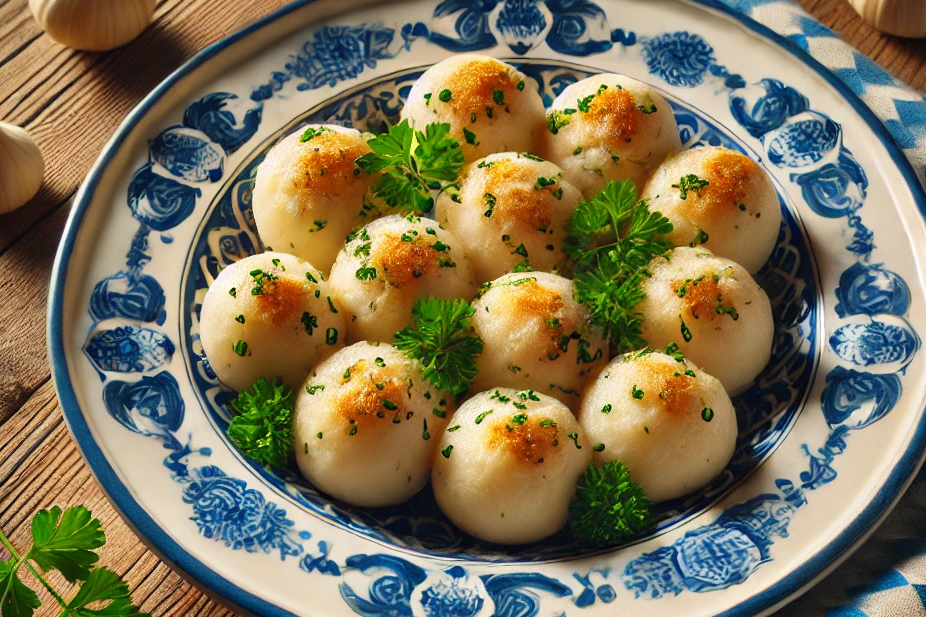Liver dumplings

Liver dumplings, a traditional dish in many cultures, are popular with lovers of home cooking. These hearty dumplings, rich in liver and often enriched with onions, herbs and bread or flour, are known for their intense flavor and nutritious properties. While humans enjoy the culinary variety of liver dumplings, the question arises whether they are also suitable for our dogs. This article takes a look at liver dumplings from a dog nutrition perspective and assesses their pros and cons for our faithful companions.
Liver dumplings are a savory dish traditionally made from ground liver, usually from pork or beef, and a binder component such as bread or flour. While liver is recognized as a nutrient-rich organ meat, it's important to consider the overall impact of the ingredients contained in liver dumplings on dogs' health.
What are liver dumplings?
Liver dumplings are made by mixing finely ground liver with ingredients such as soaked bread or rolls, eggs, onions and various spices. The mixture is formed into balls and cooked until they are firm. In the human diet, liver dumplings are often served as a soup garnish or main course and are particularly common in German, Austrian and Czech cuisine.
Benefits of liver dumplings for dogs
High nutrient content
Liver is rich in vitamin A, B vitamins, iron and other minerals that are essential for dogs' health. These nutrients support a variety of bodily functions, including supporting vision, the immune system and skin health.
Protein source
As an organ meat-based food, liver dumplings provide a good source of high-quality protein, which is important for building and maintaining muscle tissue, skin and coat.
Disadvantages and precautions
High vitamin A content
While vitamin A is important for dogs in adequate amounts, excessive intake can lead to vitamin A toxicity, which can cause serious health problems such as joint pain and deformities.
Additional ingredients
Ingredients commonly used in liver dumplings, such as onions and certain spices, can be toxic to dogs. Onions, for example, can lead to hemolytic anemia, a serious condition that damages red blood cells.
Risk of gastrointestinal problems
The rich and fatty ingredients in liver dumplings can cause gastrointestinal problems in some dogs, especially those with sensitive stomachs or special dietary requirements.
While liver dumplings contain nutrient-rich ingredients that can provide health benefits for dogs in moderate amounts, caution is advised. The potential risks, particularly the risk of vitamin A toxicity and the toxicity of certain additional ingredients, make it necessary to feed liver dumplings only in limited quantities and with your dog's individual health in mind. A balanced diet specifically tailored to your dog's needs remains the key to a long and healthy life by your side.
If you notice any signs of hypersensitivity or poisoning in your dog, you should see your vet immediately. We are not a substitute for a vet, but we try to be as accurate as possible. Every dog reacts differently and we recommend you get a second opinion or consult your vet if in doubt.
Stay healthy and take good care of your four-legged friend!😊
Similar to Liver dumplings
Semmelknödel, a specialty of German and Austrian cuisine, are dumplings made mainly from stale bread or bread rolls, milk, eggs and spices. They are traditionally served as a side dish to meat...
Potato dumplings, often made from boiled and then mashed or grated potatoes, are a staple in many European cuisines. The dumplings may also contain flour, eggs and spices to improve texture and...
Semolina dumplings, prepared from wheat semolina, eggs and often refined with spices and herbs, are known for their soft consistency and subtle flavor. While in the human diet they are mainly found...
Apricot dumplings are a popular dessert characterized by their juicy apricot filling and soft dough coating. In their classic form, they are a combination of sweetness and satiety that is considered...



